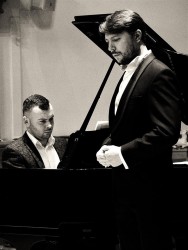 United Kingdom Chopin, Dvořák, Rachmaninov, Schumann, Tchaikovsky and others: Alexey Gusev (baritone), Paulius Rudokas (piano), Egle Sarmavicuite (piano), Polina Shakhanova (dancer), Canongate Kirk, Edinburgh, 16.12.2018. (GT)
United Kingdom Chopin, Dvořák, Rachmaninov, Schumann, Tchaikovsky and others: Alexey Gusev (baritone), Paulius Rudokas (piano), Egle Sarmavicuite (piano), Polina Shakhanova (dancer), Canongate Kirk, Edinburgh, 16.12.2018. (GT)

(c) Jack Thompson
Schumann – Kinderszenen Op.15; Dichterliebe Op.48
Rachmaninov – Melody Op.3/3; Three songs – ‘In the mysterious silence of the night’ Op.4/3; ‘He has taken everything from me’ Op.26/2; ‘Christ is risen’ Op.26/6
Chopin – Polonaise Op. 53
Leoncavallo – Cascart’s aria (Zaza)
Vincenzo Di Paola and Sandro Taccani – ‘Come prima’
Dvořák – Slavonic Dances Op.46 Nos.1 & 2
Rossini – ‘Largo al factotum’ (The Barber of Seville)
Tchaikovsky – Excerpts from The Nutcracker Suite Op.71a for 4 hands, arr. Eduard Langer; ariosos from Iolanta and Eugene Onegin
Russian Songs – Dargomijsky’s ‘I am in love with you’; ‘Kalinka’; ‘Dark Eyes’
This concert at the Canongate Kirk was festively programmed yet contained enough music to allow the perceptive listener good judgement about the outstanding talents of the performers for which this was a showcase of their musicality and artistry. The main attraction was the young baritone Alexei Gusev who has been receiving fine reviews in recent years at Scottish Opera. I remember his portrayal of Robert in the company’s production of Iolanta last season which was a highlight of the performance. He is fortunate in that he has youth on his side and baritones tend to grow and develop just as a good wine matures with the years. His accompanist the Lithuanian pianist Paulius Rudokas is also a distinguished young musician and has won several piano competitions both in his native Lithuania and in Poland. Rudokas has worked with the BBC Scottish Symphony Orchestra in Glasgow and he proved another star of this concert revealing considerable talent in European and Russian repertoire. His contribution – together with Rudokas’s wife Egle Sarmavicuite – in the pieces for four hands was notable for their matchless affinity with Tchaikovsky’s The Nutcracker ballet.
Opening the first part of the evening with German romantic pieces by Schumann was adventurous and unexpected given that these artists are best known as interpreters of Russian music. Certainly Rudokas’s handling of Schumann’s Kinderszenen was admirable, and he handled the subtle piano writing with appropriate warmth, as he did in the Chopin Polonaise; certainly the remainder of the Russian programme revealed him at his best. The pieces for four hands with his wife were spectacularly well handled, with marvelously fine control of the dynamics of the Tchaikovsky Nutcracker excerpts. The piano duo played two pieces from Dvořák’s Slavonic Dances showing superb technique and musicality and showing the kinship between the two great Slavic composers. Rudokas’s playing was a highpoint, and it is a pity we didn’t hear more of him as a soloist.
For the young baritone Alexey Gusev to sing Schumann’s Dichterliebe was challenging as I have heard him only in Russian repertoire, and the voice may not be best suited to German romantic lied. However Gusev revealed a fine dusky voice for these beautiful pieces; he is a fine artist able to convey the youthful poetry of Schumann’s songs. Too often when we hear Russian singers here, they only perform songs from their own Slavic background, but Gusev proved more than able in these fine lieder from the heart of the German Romantic tradition. This only served to make us impatient to hear him in Russian songs, and he did not disappoint. However, before the Rachmaninov songs, we heard an Italian opera aria from Leoncavallo’s Zaza, in which he showed a magnificent handling of verismo, and then a stunning rendition of Figaro’s ‘Largo al Factotum’ from Rossini’s The Barber of Seville showing his voice off to full effect; particularly fine too was the Italian song ‘Come prima’. Rachmaninov’s ‘In the mysterious silence of the night’ was impressive, but for me the highlight of the concert was ‘Christ has arisen’, and the other two wonderfully idiomatic Rachmaninov songs were equally well performed by Gusev with fine accompaniment from Rudokas.
Gusev characterized with great musicality the three fine ariosos from Tchaikovsky’s Iolanta and Eugene Onegin and following these a song from the less well-known Dargomyszhky, before he ended with the popular ‘Kalinka’ and ‘Dark Eyes’, darkly romantic Slavic songs most famous for their celebrated interpretation by Gusev’s fellow countryman Feodor Chaliapin. It was Gusev’s musicality in both Russian and West European repertoire which showed his exceptional promise; his characterization of different repertoire embracing falsetto, comedy and the poetry of Schumann were the pluses from his recital. On this evening the young singer from Rostov has shown Russia is still providing us with outstanding voices in opera and song recital. One must mention the surprise package of a ballerina dancer Polina Shakhanova in ‘Danse de la fée Dragée’ and the ‘Trepak’ during The Nutcracker excerpts which emphasized the festive atmosphere allowing the Edinburgh audience a cheerful journey home.
Gregor Tassie
